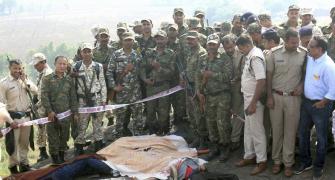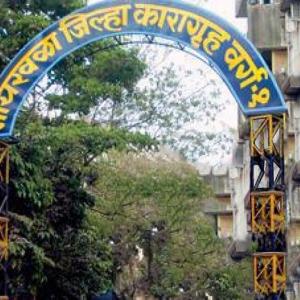'It is not possible to survive in jail unless you are part of a group.'
'They cover your back as you do theirs.'

His time in prison, he says, was nightmarish and the only thing that kept him going was his belief in God and the adage 'this too shall pass'. Photograph: Reimaging by Dominic Xavier/Rediff.com.
The Supreme Court last week issued a range of directions on prison reforms, including asking state governments to appoint counsellors and support personnel to counsel prisoners, especially first-timer offenders.
The apex court was hearing a Public Interest Litigation filed in 2013 on the inhuman conditions prevailing in the 1,382 prisons across the country.
Justices M B Lokur and Deepak Gupta directed all states to go into the availability of medical assistance provided to prisoners and take whatever steps are needed to remedy the situation.
As the spotlight returns to the conditions of our prisons, Rediff.com's Swarupa Dutt speaks to a young IT graduate jailed for visa fraud committed by his agent, to get an insider's view of life in jail for undertrials.
The young man, in his early twenties, did not want his name revealed or photograph used, since only his immediate family is aware of his time in jail.
The man -- we shall call him John -- said he was in a hurry to go to Portugal as his family had severe financial problems with several outstanding loans after his sister's marriage.
He had a younger brother in college and elderly parents.
Under Portuguese law, those born in Goa before 1961, when the state was liberated, continue to be Portuguese, provided their births are registered in Portugal.
Their descendants are also eligible for Portuguese passports and holding a Portuguese passport means entry to the European Union.
However, the agent who was tasked with getting John's documentation prepared fake documents.
"One document said I owned a chicken farm. I told the agent it wasn't true, why were the documents fake? He said that's how people go and it was standard operating procedure," John said.
John said he should have stopped the agent, but he was desperate to go to Portugal and start a new life.
"I am a computer graduate, but I did not use my mind. I repent. I don't know why I agreed. My mind wasn't working," John said.
John spent seven days in police custody and 38 days in jail.
He is now out on bail, but is barred from leaving the country till his case comes up for hearing again.
This then, is an account of that experience.
POLICE CUSTODY
AZAD MAIDAN POLICE STATION
APRIL 25-MAY 1
On the third day, April 27, I wanted to commit suicide.
I didn't because there was nothing I could use to kill myself.
No bedsheet, no sharp instrument, no shard of glass, no fan.
The lock-up inside the Azad Maidan police station was a bare room, probably 10x10 feet, maybe more.
People have often asked me the size of the lock-up, but the size really depends on the number of inmates.
Sometimes I was alone inside, sometimes there were five others. At times 10. That's when it is particularly small and oppressive.
The lock-up shares space with a toilet. The stench is fresh in my nostrils even now.
Anyone who is arrested will say they are innocent. I have never ever done anything remotely illegal, let alone criminal.
This was my first offence. The cops told me I was in jail only because of my agent and my stupidity.
The cell had a small window near the ceiling that allowed no view, but at least I knew if it was day or night.
The floor looked like it had never been swept. The cops gave me newspapers to sleep on.
My cousin came to meet me on the third day and the police told me I would be released when my case came up for hearing next week.
I could handle a week in the lock-up, but I would get rattled when the cops would tell me I would be jailed for three years.
In retrospect, I know they said it without any basis, but I believed them. I had no reason not to.
So I left it to God. I told Him, you have to take care of me.
I didn't have a change of clothes. I wore the same jeans and T-shirt, I had worn to the consulate from where I was taken into custody, for the next seven days.
I'd bathe, wipe myself down with the same clothes and wear them.
Possibly the worst punishment is not having fresh underwear. And no fan when it's April.
I had to pay for breakfast, but lunch and dinner is on the house. I had to deposit the money I had on me with the police station before I was put inside the lock-up.
I was carrying Rs 500, so I bought breakfast with the money, and a toothbrush, toothpaste and soap.
Lunch is generally rice, chapati or puri and a watery dal.
There is no fixed time for meals, you are fed when the cops decide it's meal time.
On the seventh day in custody, my lawyer and the cops told me I would have to go to jail for a day and would then be released.
I was still not worried because again there was a deadline.
JUDICIAL CUSTODY
ARTHUR ROAD JAIL
MAY 1-JUNE 7
The police took me to Arthur Road jail in a Tata Sumo.
I entered the gate and in a room just inside the gate, they strip-searched me to ensure I wasn't carrying contraband or weapons.
Then they took my fingerprints, mug shot and gave me an ID card.
Prisoners who are in jail for a day or so are taken to the after barrack.
For longer stays, prisoners are taken to the main barrack.
I entered the after barrack at 7.30 pm.
It was overwhelming, the people, the barrack, the reality of being in jail. I wasn't worried since I was to get bail the next day.
Next morning, no bail papers, no bail.
I was taken to the main building.
There are four barracks to a building; each barrack has approximately 200 prisoners. Maybe. I didn't really sit and count.
It just seemed like a whole lot of people. Very crowded.
I had to carry the ID card around everywhere, even in the toilet, except when I was having a bath.
The card had my name, photograph, the Indian Penal Code sections under which I was held, my enrolment number, the inspector's signature and my barrack number -- #7.
They gave me a bar of soap. It was pink and came in a pink cover that had the word 'jail' printed on it.
It wasn't branded soap that you get in a shop. And a plastic plate and bowl.
Since I was an undertrial I could keep my own clothes.
At that point I did think it would be nice to wear jail clothes. I hadn't changed my clothes for a week.
I think what unsettled me the most was the sense of complete isolation.
For the first four days, I had no information from the world outside -- neither from my family nor my lawyer.
Why has no one come to meet me?
Do they even know I'm in jail?
How long would I be here?
What was the next step?
No answers.
Nobody to help you.
You are on your own.
You can use postcards to write to your relatives.
During the first few days in jail with no information coming in, the police told me I could send a postcard.
My family got it after 20 days.
I had sent another postcard, which reached my family in Goa so late that I was at home to collect it.
I held onto the belief that God was with me and He would help me. And that helped me.
In jail, every morning I went for the bulava.
If you have a visitor, the jail officials call out your name and you can meet your visitors in a separate building.
Your name is called out twice, if you don't hear or are not in the room, nobody will tell you because the other prisoners don't know your name and anyway couldn't be bothered to help.
Your visitors will go away without meeting you. You can get visitors once a week.
On the fourth day I got a bulava. My cousin had come to meet me and he said the hearing would be next week.
He gave me a fresh set of clothes.
Again, the belief that I would be out in a week helped me get by.
You can get used to anything if you tell yourself 'This too shall pass'.
But next week I was told the judge was on leave.
Every week my family would come to meet me and every week it was the same story -- the judge was not there.
The last few weeks in jail were the best.
I had repaired a computer in the office in the jail and the jail officials asked me to work with them keying in bail applications.
I would go in to the office and work the whole day till the lock-in time of 6 pm. They were nice to me.
One day as I was working in their office, the jail officials told me my papers had arrived from the lawyer and I had got 20 years in jail.
If you spend a couple of weeks in jail, you get a hang of things, and by then I knew my offence would not warrant that sentence. I knew they were joking.
But I had got bail. I can't describe what I felt.
The bail papers are kept in a box, if your name appears in the box you get bail.
I had lost hope of getting bail because my case never made it to court most of the time.
Either the chargesheet had not been filed, or the advocate wasn't there or the judge was absent and one time the steno wasn't there or the dates kept getting postponed.
Prayers work.
If you are an undertrial, your day is spent eating, sleeping, and using the toilet.
There is literally nothing to do. The boredom is frightening. But first, survival.

'It was stinking so much I couldn't sleep. You can pay to get a better place to sleep, but I didn't bother.'
Illustration: Dominic Xavier/Rediff.com
I never spoke to anyone initially. I was scared.
They were all tapori types and I've never known people like that.
But in the first few days, a guy came up to me and struck up a conversation.
Why was I in jail, when would I get out etc.
He then asked me if I was Goan and said I could join his group. Groups are called handis.
It is not possible to survive in jail unless you are part of a group.
They cover your back as you do theirs and you split the tasks.
As undertrials none of us had to do any work, so when I say tasks, it means the basic tasks needed to survive.
We were four. I would stand in the queue and get food for the rest.
The others guarded our clothes while we had a bath or went to the toilet or left the barrack.
Or others would listen in to the bulava if you weren't present, or break you into the jail rules and steer you clear of trouble.
It's the difference between waking up each morning after an uneventful night or being beaten up by other inmates and jail officials.
Each person is allowed to get spending money of Rs 2,500 per month.
You have to ask your family to send you a money order for it.
I had the remainder of the Rs 500 I had carried with me when I was sent to police custody.
You can use the money to get food from the canteen like biscuits, pickle, wafers, jam, chivda.
Some of the older prisoners use the money and give it to a group, which then does all their work for them -- wash clothes, get food, give them a massage, wash their plates.
They work like slaves.
I was tasked with getting food for my group and washing the utensils, which means standing in the queue for four hours every day.
I would eat my meals with the group, but not fraternise.
My family had told me to keep my distance and not share details about my life outside jail with anybody.
I'm not in touch with any of them. The Goan guy called me once when he got bail, but that's about it.
I don't want to keep in touch with any of them.
I never got involved in any fights. I just kept to myself.
The Goan guy told me people will come up to you and try to pick a fight.
He told me don't ever say anything. Just agree with whatever they say.
When fights take place, the police beat up both sides.
They take you out of the barrack, make you lie down and hit you with bamboo sticks.
They tie both your hands and legs and hit you on the thigh, calves and hands till prisoners beg for mercy.
The barrack is a rectangular, large room.
Around 200 inmates sleep here. Some were undertrials, some prisoners.
The four corners are the best places and are reserved for those who have been in jail for a while.
One side of the barrack adjoins a row of toilet cubicles.
So this is how it works.
First, the older inmates take their places in the night and then you fit into the spaces in between.
Like the way bikes are parked in a car park.
There are people sleeping all around you, inches away.
You have to sleep with your arms on your sides.
If you toss or turn or flay around in your sleep and hit people lying next to you by mistake they will yell at you.
There is no fixed place for sleeping.
The prisoner in charge of the barrack gives you a new place every day.
New prisoners like me would get to sleep in the middle, which means it's next to impossible to get up in the night and use the toilet because you will most certainly trip over people.
Lights are on 24X7 for security reasons.
I had to sleep near the toilet for the first two days.
It was stinking so much I couldn't sleep.
You can pay to get a better place to sleep, but I didn't bother.
Once you finish six months in jail you can write an application on a postcard to the jail Investigative Officer for a bedsheet and a pillow.
It was extremely hot. There are fans high up on the ceiling.
You can see the fans rotate slowly, but there is simply no breeze wafting down.
The prisoners told me Sanjay Dutt (jailed under the Arms Act in the 1993 Mumbai serial blasts case) was responsible for getting fans in the jail.
I also heard lots of people had committed suicide in the barrack and it was haunted.
But frankly, all this didn't bother me because being in jail itself is a nightmare.
There is a small Hindu shrine in one corner of the room and a copy of the Quran is kept in another corner.
The Muslim prisoners offer namaz five times a day. The first namaz is at 5 am.
They generally sleep near the Quran and that part of the room is called Mullah galli.
Once, by mistake, I stepped on the bed sheet they were sitting on while offering namaz. I don't think anyone has yelled at me so much. Ever.
There are bedbugs, rats, cockroaches everywhere.
Pest control is carried out every month, but it is clearly not enough.
There are two cement pools or water tanks with four taps for each barrack of 200 people.
This water is used for drinking, washing clothes, ablutions and a bath.
I used to have a bath at 5 am, an hour before the wake-up call, so I could skip the rush to after breakfast. (See the schedule alongside).
6 am: The jail officials come to each barrack and bang on a plate with a stick to wake you up. Then you sit in a queue and attendance is taken.
7 am: Breakfast. Tea and poha or sheera.
7 to 10 am: Bath
You can have a bath immediately after breakfast.
9.30 to 11.30 am: Lunch is served.
By 12 noon you are done.
Each barrack has one TV. Between 7.30 am and 8.30 am you can listen to FM radio. From 12 noon to 1.30 pm you can see Doordarshan.
1.30 to 3 pm: Siesta or walk around. But the barrack is so congested that there is really no place to walk.
3 pm: The building gates are open.
3.30 pm: Tea.
You can walk around or continue sleeping.
4 to 6 pm: Wash your clothes or have a bath.
6 pm: Gates of the building are shut and you go back inside your barrack. Attendance is taken.
Dinner:7 pm
7.30 to 9.30 pm: Free time.
9.30 pm: You are allotted your place to sleep.
Early in the morning, the water is fresh. But once people start having a bath, the tank gets dirty with soap water.
The bath is hurried because there are hundreds of people waiting in line.
The water timing is between 7 and 10 in the morning and 4 and 6 in the evening. Then the tap is closed.
There is a barrel of water for people who have a bath early in the morning like I did.
The toilets are all Indian style and filthy.
Again, you have to wait in a queue to use them. There is no running water, so you have take a lota inside.
People are very dirty. They defecate and just get up and leave. So if you're up next, it isn't very pleasant.
There around 50 toilets to a barrack, apart from 10 toilets inside the barrack.
Once they close the gates you can't go outside so you use the 10 toilets inside.
There are no latches in the toilets and some are permanently closed.

His task in the group was to stand in line for food for all the members.
Illustration: Dominic Xavier/Rediff.com
There are fights for food all the time. I would get food for all four of us.
They begin serving lunch from 9.30 am. Rice is served first.
It's not like a buffet where everything is served at the same time.
Dal is served an hour after rice, followed by rotis.
The food is brought inside the barrack from the kitchen and doled out with a bowl.
If you eat breakfast at 7 am you will get hungry by 11.30 and anyway there is nothing to do except eat and sleep.
Each queue takes you 15 to 20 minutes and you have to go thrice.
The rotis are dry and hard. Unpalatable. Everyone gets two rotis each. I used to get eight rotis for the group.
You can't lie and take more since the people who serve you are prisoners too and they know which group you belong to.
These people get paid. There are weevils in the rice. I've had food poisoning and loose motions very often in jail.
I am back home in Goa cherishing my time with my family.
Just enjoying the freedom of eating or sleeping or bathing or talking when you want to. No regimentation.
The joy of being around people who care about you.
The freedom from fear and the real hope that a better life is possible.
My passport is still with the police.
I am going to clear my name.
I am going be a successful person.
I will go to Portugal with every single document in place.
I will continue to trust in God.









